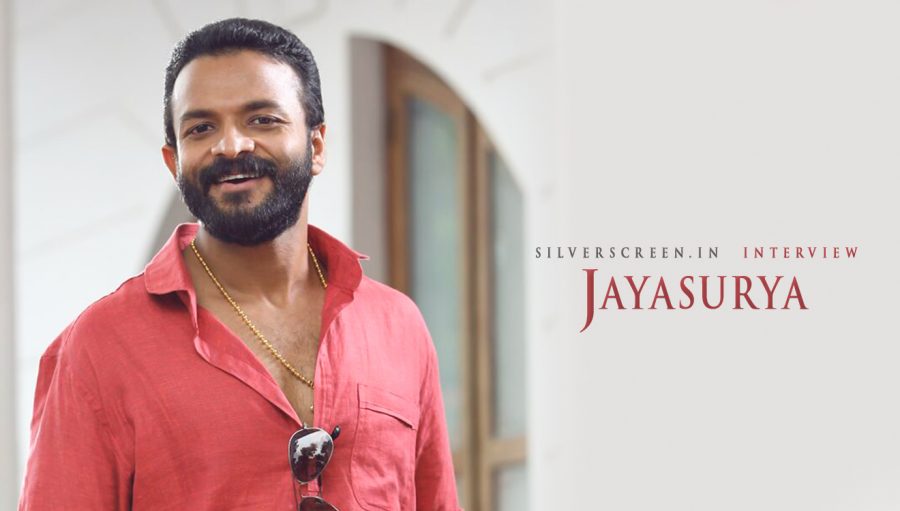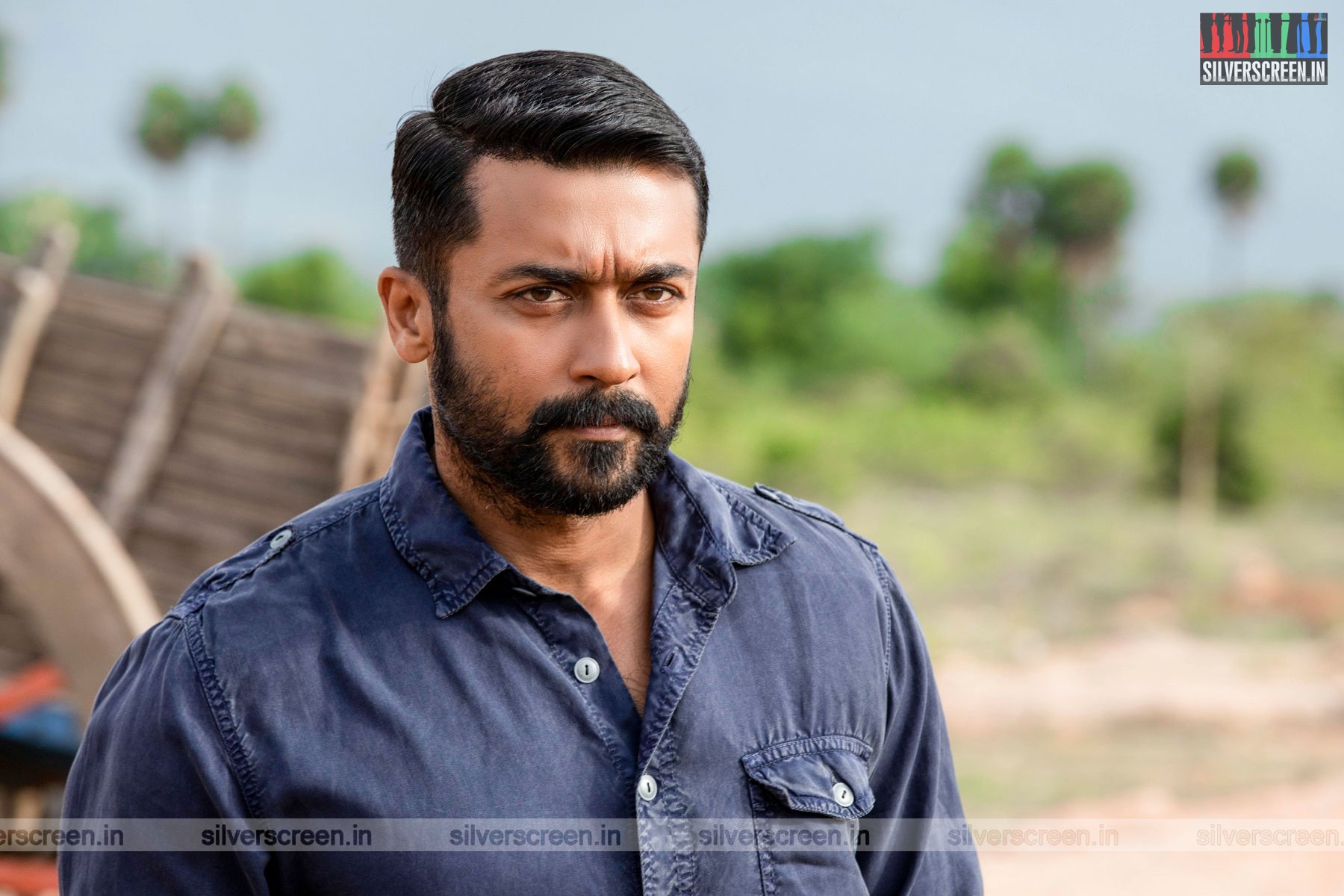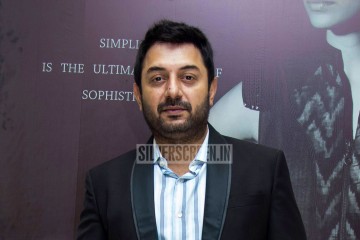Actor Jayasurya is slowing down, taking one step at a time, finishing one film before darting to the next. That’s a radical decision, he admits, “there was a time when I was doing eight films a year.”
In 2013, Jayasurya starred in twelve films, a record number in his career. In 2017, he worked in four projects, out of which Captain hit the screens last month. Next, he will star in Njan Marykutty (I, Marykutty), a film which will be directed by Ranjith Sankar, his close friend and regular collaborator, and co-produced by both of them. “That’s the only film I am focusing on right now,” the actor says, “I have finally come out of the state of confusion and insecurity that stardom brings with it.”
Right now, his career is sure going through a sunny period. Last year, he had the biggest box-office hit of his life through Aadu 2, a comedy directed by Midhun Manuel Joseph. In 2016, he earned a Jury Mention at the National Film Awards for his performance in Su Su Sudhi Valmeekam, a feel-good drama centered around a man suffering from low self-esteem, and Lukka Chuppi. The elated actor told The Hindu in an interview soon after the win, “I have always been the runner-up, never the winner…I’m astounded that I actually won and that too a National Award. It’s my Oscar!”
It was his first major achievement in a career that spans over two decades, although he had been taking the audience by surprise with a number of nuanced performances from the beginning of 2010. He debuted as a junior artiste in Dosth (2001), a romantic-comedy which had Dileep, Kavya Madhavan and Kunchakko Boban playing the lead. He appeared in a blink and miss role in the film. The real break came in 2002, through director Vinayan’s Oomappenninu Uriyaada Payyan, a romantic-drama centered around a couple who are speech and hearing impaired. The actor spent the decade working in comedy and romantic dramas. It was the grey-shaded Venky in Arun Kumar Aravind’s Cocktail (2010) that changed the track of his career. Slowly, he turned himself into a deft character artiste through films like Beautiful, Trivandrum Lodge, Iyyobinte Pusthakam and Apothecary.
In a conversation with Silverscreen.in, Jayasurya spoke about his acting career and the kind of films he would like to produce, about Shaji Pappan, his character in the Aadu franchise that has become a youth icon, and Captain, his latest film that is garnering acclaim.
*****
Jayasurya claims to have never watched a football match in his life before he was signed on to play veteran footballer and former Indian football team captain VP Sathyan in Captain.
“To play Sathyan, I had to make myself look like a professional footballer. In the film I’d worked on before this one, I had a different physique. I would start practicing football under a coach from early morning, followed by a long gym session. I followed a rigorous diet. But this is just one part of the preparation, a tool to convince people that I am a footballer,” he says, adding, “Sathyan wasn’t just a footballer, but the captain of a team. I had to bring that confidence and aggressiveness in my body language. He didn’t smile a lot. I had to pay attention to little details of his personality. For instance, look at the body language of a regular footballer walking towards the field. It’s peculiar.”
Sathyan, who suffered depression for a long time, committed suicide in Chennai in 2006. For Jayasurya, portraying depression was a walk on a tight rope. “Sathyan wasn’t grieving. He was suffering from something more complex. I didn’t, in fact, do much research on depression. I understand that it is a mental state where the person hangs on to a particular thought, unable to move on from it. If I had made a slip, it would have been interpreted as ‘over acting’. I just tried to empathize with him completely, without trying to be logical or asking questions. Before the shoot began, I went to his house, and asked to be left alone in his room for sometime. I just sat there meditatively,” the actor says.
One of the most treasured appreciations he received was from Anitha, wife of Sathyan. “She said I was flawless in the film. ‘I could only see Sathyettan on screen,’ she told me.” Sathyan’s friends, like footballer IM Vijayan, who have known him from close quarters, left him overwhelming messages of appreciation after watching the film.
When I ask him if working on Captain turned him into a football fan, he laughs. “Not at all. I always abandon a role once the shoot is over. I have never been a football buff, and I am still not. I watched some matches as part of preparation, but now that the shoot is over, I no longer watch football.”
*****
It was after finishing Captain that he worked on Punyalan Private Limited and Aadu. “I have never faced this problem of being unable to move on from a character,” he says. “One role that stayed with me for a little longer than usual is Raghunandan from Lukka Chuppi. I often think about him. I can’t think of another character that earned me so much appreciation, from the public as well as from the industry fraternity. Mammookka (Mammootty) said he loved the film, and Prithviraj, when we met on the sets of Amar Akbar Anthony, hugged me and said the character moved him so much. That day, we watched the movie again at his house.”
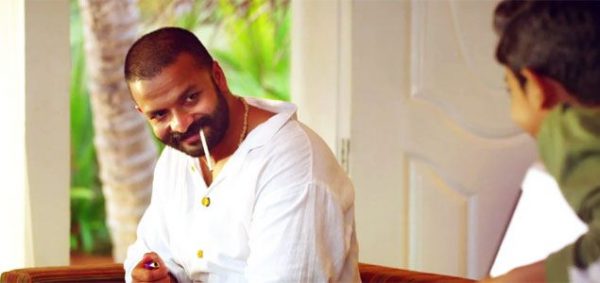
Lukka Chuppi, directed by Bash Mohammad, was a box-office failure when it released. The film unfolds over one night, when a group of friends from college get together at a resort after 15 years. It later became an overnight hit on YouTube and online streaming websites where it landed illegally.
“I don’t know why some good films fail. I really don’t,” says the actor. “Mammootty said it must be the title ‘Lukka Chuppi’ that put people off. Another title that was in consideration was ‘1987 Batch Maharajas’. It could have worked well in favour of the film.” Titles are very important, says Jayasurya. “See the kind of impact a name such as Bharatchandran IPS makes. It is powerful in itself. As a producer, I do take note of things that make a movie work at box-office,” he says.
Jayasurya ventured into movie production through Punyalan Agarbathies (2013), in which he played the lead role. He was the co-producer of Pretham (2016) and Punyalan Private Limited (2017). “I think I am good at selling a movie. I like learning about new marketing techniques, and changing audience’s tastes.”
He is active on social media, and makes use of its opportunities to stay closer to his audience. Every once in a while, he interacts with his fans through Facebook Live, answers their queries. Sometimes, he also voices his opinion on social issues. “The television era is making way for the Internet. People are addicted to social media. It can be very effectively used to promote films,” he says. “I don’t want to promote my movies by hurting some community or a person. But I like to try different new things.”
That said, the actor adds that he doesn’t want to be an outright movie producer. “It is not exciting to invest money in a film with the sheer aim of making profits. I want to produce great films; ones that offer me a performance-oriented role.”
All three films he co-produced were directed by Ranjith Sankar under his home banner Dreams N Beyond. The duo’s films have always been commercial hits. “It’s a partnership built on hard work. He is someone who is constantly thinking of new ideas, new stories.. Sometimes he doesn’t sleep the whole night, working on screenplays. I am like that, too. I like being on work mode.”
Jayasurya and Ranjith Sankar have collaborated on six films so far. The actor was also considered to play the lead role in Ranjith’s Ramante Eden Thottam (2017), but he opted out of it, and eventually the role went to Kunchakko Boban whose performance in the film garnered acclaim. Their next, Njan, Marykutty, is a project that both of them describe as their most challenging work till date.
*****
We talk about Punyalan Private Limited, the sequel to Punyalan Agarbathies, a popular comedy-drama in which he played an entrepreneur from Thrissur fighting the bureaucratic and political rot. The second part, however, lacked the quintessential feel-goodness that made the first part a winner. Nyla Usha, who played the effervescent Anu, Joy’s wife, wasn’t a part of the cast.
Didn’t the feel-good drama get reduced to an aggressive social lecture in the second part, I ask him.
“We had a story in mind, about a man who loses it all, thanks to the insensitive system, and decides to register his protest. It occurred to us that it would be interesting to bring Joy Thakkolkaran back through this film. We didn’t plan it as a sequel to Punyalan Agarbathies,” he says, “We could have included the character played by Nyla Usha, but we didn’t want to offer her a small insignificant part. She is a friend. We didn’t want to call her for no reason. And in this film, Joy is a man who goes all out to achieve his goal. He gets arrested on purpose, does things that usually makes a wife insecure. Naturally, she would have asked him to stay out of it.”
Aadu 2 was a sequel too, of Aadu Oru Bheegara Jeeviyaanu (2015), with the same cast and crew. The first part had bit the dust at the box-office, but eventually became a trend-setter among the youth in the state. “At the time of its release, the director and the team were so excited. Everyone had their expectations sky-high. But I asked them to calm down because I knew box-office is a gamble and we could lose it very easily,” Jayasurya tells me. Did the failure hurt? Not really, he laughs, “I am well used to making flops.”
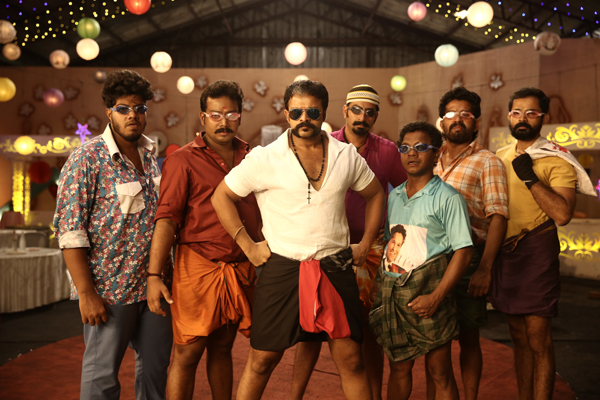
“What really stunned me was the astounding reception the film got later, when the DVD was out. I wondered what could have caused this overnight sensation. I assume people loved the film because it isn’t cheesy. The goofiness of Shaji Pappan and his gang is very convincing. The humor is very contemporary, hence youngsters could relate to it. The character, Shaji Pappan, is a fool with a great mass aura, something new in Malayalam cinema,” he says.
When actor-producer Vijay Babu, director Midhun Manuel and Jayasurya decided to make a sequel to the flopped film, they were rather well-planned. “We wanted this film to establish trends, fly high. So mass moments were planned in detail, elements like the double colored dhoti were added on, promotions were carefully chartered. Last time, Shaji Pappan couldn’t do the fight scenes because he had a sore back (laughs). This time, we wanted him to do action scenes. Aadu 2 was a movie entirely designed for the audience who loved part one,” he says.
*****
Jayasurya has several fan associations in his name; they love him for the way he conducts himself off screen, without the airs of a star. He tells me about a recent incident that happened at a shooting location. “There were many people waiting to meet me. In the crowd, I noticed a young man, struggling to make himself noticeable, waving at me. It was evident from his face that he was an earnest admirer. I went up to him, spoke to him, clicked a picture with him. Isn’t it nice if your attention can just make a person’s day better?”
He has no qualms about social media users flooding the Internet with opinions masquerading as film reviews right from the opening day of the film. “It’s their freedom of expression. They watch a film, they have the right to speak out their opinion on it,” he says.
What bothers him though, is a certain other category of film-goers.
“It is not okay when some people just go about spreading false news on social media, and film clippings shot inside theater. That’s very wrong. If you like an actor, you should restrain yourself from circulating key moments from films on social media.”
Is it a problem when you are surrounded by people who constantly flatter you, and never give you a slice of criticism, I ask him. He laughs. “I know that. I consciously never let these praises get to my head. I am essentially a loner. I have an existence cut off from this limelight. I am constantly doing an introspection, criticizing my work than anyone else.”
His son, Adithya, is a staunch movie-buff who watches his films and gives honest opinions. “Once he pointed out a particular gesture that I had been repeating a lot on screen. That’s something I hadn’t noticed. He helped me change it.”
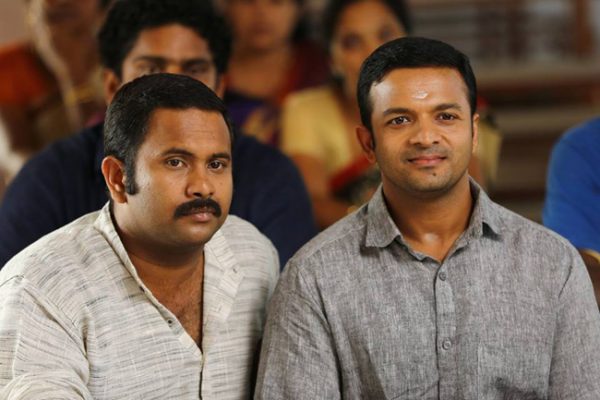
I remark that over the years his acting style has become more restrained. “The discipline must have come with age,” he reflects. “My philosophy is to declutter life and mind every once in a while. I respect the Islamic tradition of going on a pilgrimage to Mecca. To go on that pilgrimage, one has to pay back their debts, clear all dues in life. That’s a very rejuvenating process. It’s like starting life afresh.”
*****
Recommended
Jayasurya is determined to age gracefully onscreen and off-screen. “I will not do a chocolate-lover role anymore,” he declares. “I will only choose those roles that suit my age. I can’t do the kind of characters I played in Swapnakkoodu or Chocolate. I have told my wife to be prepared for bad days because I am going to do only those films I really want to do. Even if that’s one movie a year. I am free of those insecurities I had in the beginning of my career. At the end of the day, isn’t it enough to earn just as much to live a proper life?”
Of late, the actor has discovered the pleasures of traveling, and now, he swears by it. “Sometime ago, I visited parts of the Himalayas; the Kailash mountain and nearby areas. I want to go there again,” he says. “There are many places I want to travel to, but I have realised that rather than the places we see, our attitude is more important. When I set out to see the Himalayas, I thought that it would move me deeply. But unless we are in the right frame of mind, nothing would matter much. We could travel the whole world, and yet be unhappy.”
*****
The Jayasurya interview is a Silverscreen exclusive.
